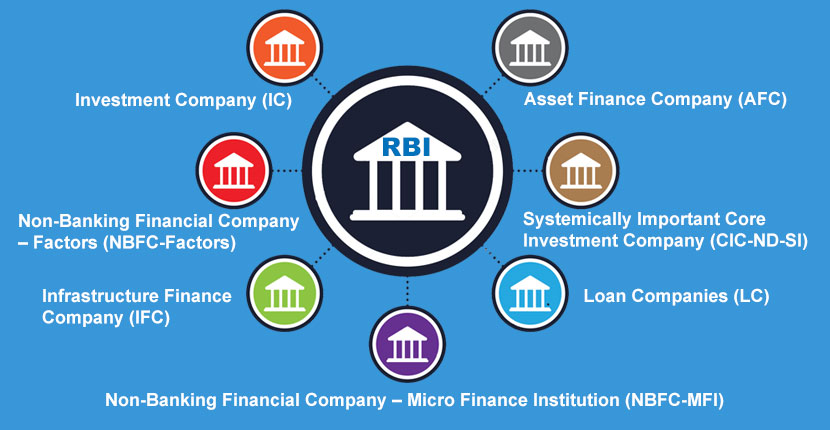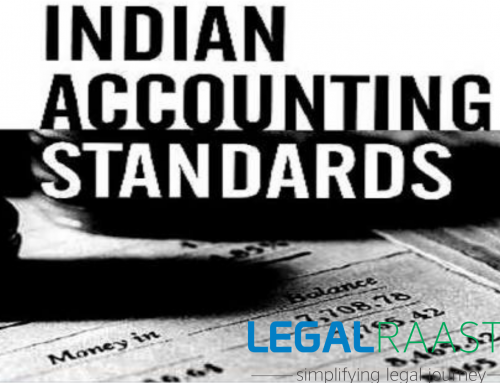Meaning and Types of NBFCs
Contents
- Meaning and Types of NBFCs
- Classification of NBFCs based on the nature of its business
- Reclassification of NBFCs w.e.f. 6th December 2006
- Loan Company(LC)
- Investment Company (IC)
- Core Investment Companies:
- Asset Finance Company (AFC)
- Mutual Benefit Financial Company(MBFC)
- Classification based on Size of Assets
- Returns to be submitted by NBFCs-ND-SI:
- NBFCs vs. Conventional Banks
- Conclusion
Non-Banking Financial Company (NBFCs) may be defined as a company registered under the Companies Act, 1956 and under the provisions of section 45-IA of the Reserve Bank of India Act, 1934. NBFCs provides banking services without meeting the legal definition of a bank such as holding a banking license.
Section 45-I of the Reserve Bank of India Act, 1934 defines ‘‘non-banking financial company’’ as–
(i) a financial institution which is a company;
(ii) a non-banking institution which is a company and which has as its principal business the receiving of deposits, under any scheme or arrangement or in any other manner, or lending in any manner;
(iii) such other non-banking institution or class of such institutions, as the Bank may, with the previous approval of the Central Government and by notification in the Official Gazette, specify.
Following are the business in which NBFCs are engaged:
- Loans and advances
- Acquisition of shares/stocks/bonds/debentures/securities issued by the government or local authority or other securities of like marketable nature,
- Leasing
- Hire-purchase
- Insurance business,
- Chit business
But does not include any institution whose principal business is that of agricultural activity or any industrial activity or sale, purchase or construction of immovable property.
Classification of NBFCs based on the nature of its business
Depending upon the nature of the business NBFCs registered under RBI are divided into four categories depending upon its nature of business:
• hire-purchase company;
• equipment leasing company;
• loan company;
• investment company;
• infrastructure finance company
Reclassification of NBFCs w.e.f. 6th December 2006
The above NBFCs registered with RBI are reclassified in terms of the NBFC Acceptance of Public Deposits (Reserve Bank) Directions, 1988 with effect from 6th December 2006 as follows:
Loan Company(LC)
A company which is a financial institution and carrying a business of providing finance as its principal business by making loans or advances or otherwise, for any activity other than its own is called a Loan Company. It is noteworthy that this does not include Asset Finance Company.
Investment Company (IC)
A financial institution carrying on the acquisition of securities as its principal business is known as an Investment company. Investment companies are further divided into the following sub-categories:
Core Investment Companies:
These are NBFCs carrying the business of acquisition of shares and securities, satisfying the following conditions on the date of the last audited balance sheet:-
- It holds not less than 90% of its net assets in the form of investment in equity shares, preference shares, bonds, debentures, debt or loans in group companies;
- Its investments in the equity shares (including instruments compulsorily convertible into equity shares within a period not exceeding 10 years from the date of issue) in group companies constitutes not less than 60% of its net assets Net assets, for the purpose of this proviso, would mean total assets
excluding –
• cash and bank balances;
• investment in money market instruments and money market mutual funds
• advance payments of taxes; and
• deferred tax payment - it does not trade in shares, bonds, debentures, debt or loans in group companies except through block
sale for the purpose of dilution or disinvestment; - it does not carry on any other financial activity referred to in section 45-I(c) and 45-I(f) of the Reserve Bank of India Act, 1934 except:
a) Investment in
- bank deposits
- money market instruments, including money market mutual funds,
- government securities, and
- bonds or debentures issued by group companies;
b) Granting of loans to group companies;
c) issuing guarantees on behalf of group companies.
Asset Finance Company (AFC)
Asset Finance Companies are companies which are financial institutions carrying out the financing of physical assets supporting productive/economic activity, such as automobiles, tractors, lathe machines, generator sets, earth moving and material handling equipment, moving on own power and general purpose industrial machines as their principal business. Financing of physical assets may be by way of:
- loans,
- lease or
- hire purchase transaction
Principal business can be defined as an aggregate of financing real/physical assets supporting economic activity and income arising therefrom is not less than 60% of its total assets and total income respectively.
Mutual Benefit Financial Company(MBFC)
Mutual Benefit Financial Company are financial institutions notified by the Central Government under section 620A of the Companies Act, 1956.
Above mentioned types of NBFCs can be further classified into:
- NBFCs accepting public deposit (NBFCs-D) and
- NBFCs not accepting/holding public deposit (NBFCs-ND)
Classification based on Size of Assets
NBFCs-ND may also be classified into (i) Systematic Investment NBFCs with assets size of more than 500 Crores and (ii) Non-Systematic Investment NBFCs with assets size of less than 500Cr.
Returns to be submitted by deposit-taking NBFCs:
- NBS-1 Quarterly Returns on deposits in First Schedule.
- NBS-2 Quarterly return on Prudential Norms is required to be submitted by NBFC accepting public deposits.
- NBS-3 Quarterly return on Liquid Assets by deposit-taking NBFC.
- NBS-4 Annual return of critical parameters by a rejected company holding public deposits. (NBS-5 stands withdrawn as submission of NBS 1 has been made quarterly.)
- NBS-6 Monthly return on exposure to capital market by deposit-taking NBFC with total assets of ₹ 100 crores and above.
- Half-yearly ALM return by NBFC holding public deposits of more than ₹ 20 crores or asset size of more than ₹ 100 crore
- Audited Balance sheet and Auditor’s Report by NBFC accepting public deposits.
- Branch Info Return.
Returns to be submitted by NBFCs-ND-SI:
- NBS-7 A Quarterly statement of capital funds, risk-weighted assets, risk asset ratio etc., for NBFC-ND-SI.
-
Monthly Return on Important Financial Parameters of NBFCs-ND-SI.
- ALM returns:
(i) Statement of short-term dynamic liquidity in format ALM [NBS-ALM1] -Monthly,
(ii) Statement of structural liquidity in format ALM [NBS-ALM2] Half yearly,
(iii) Statement of Interest Rate Sensitivity in format ALM -[NBS-ALM3], Half Yearly -
Branch Info return
NBFCs vs. Conventional Banks
- It is not a part of the payment and settlement system which is precisely the reason why it cannot issue cheques to its customers.
- Deposit insurance facility of DICGC is not available for NBFC depositors unlike in the case of banks.
- SARFAESI Act provisions have not currently been extended to NBFCs. Besides the above, NBFCs pretty much do everything that banks do.
Conclusion
NBFCs have come to be regarded as important financial intermediaries particularly for the small-scale and retail sectors with the growing importance assigned to financial inclusion. In the multi-tier financial system of India, the importance of NBFCs in the Indian financial system is much discussed by various committees appointed by RBI in the past and RBI has been modifying its regulatory and supervising policies from time to time to keep pace with the changes in the system. NBFCs are an integral part of the Indian financial system, enhancing competition and diversification in the financial sector, spreading risks specifically at times of financial distress and have been increasingly recognized as complementary of the banking system at competitive prices. The Banking sector has always been highly regulated, however, simplified sanction procedures, flexibility and timeliness in meeting the credit needs and low-cost operations resulted in the NBFCs getting an edge over banks in providing funding. NBFCs have been pioneering at retail asset-backed lending, lending against securities, microfinance, etc. and have been extending
Related Articles:
For further information regarding NBFC Registration visit our website: Legal Raasta
Or you can contact our experts at +91 8750008585.






